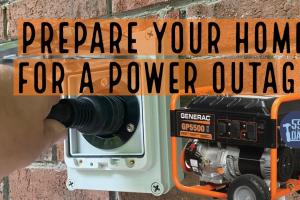Ultimate Guide to Using a Generator for Safe Home Power

-
Quick Links:
- Introduction
- Understanding Generators
- Types of Generators
- Preparing for Generator Use
- Operating Your Generator Safely
- Powering Your Home with a Generator
- Maintenance and Care
- Case Studies
- Expert Insights
- FAQs
Introduction
Generators are essential tools for providing backup power during outages, ensuring that your home remains functional and comfortable. However, their misuse can lead to dangerous situations, including carbon monoxide poisoning and electrical hazards. This comprehensive guide will delve into how to safely use a generator to power your home, covering everything from types of generators to safe operating procedures and maintenance tips.
Understanding Generators
A generator converts mechanical energy into electrical energy. It can be powered by various fuels, including gasoline, diesel, propane, or natural gas. Understanding how generators work is crucial for safe usage.
- Alternator: Converts mechanical energy to electrical energy.
- Engine: Powers the alternator and can be powered by different fuels.
- Fuel System: Supplies fuel to the engine.
- Voltage Regulator: Regulates voltage output to ensure stable power supply.
Types of Generators
There are several types of generators available, each with distinct advantages and disadvantages:
- Portable Generators: Ideal for temporary power needs. They are versatile but require manual setup.
- Standby Generators: Automatically provide power during outages and are installed permanently outside your home.
- Inverter Generators: Produce cleaner power and are quieter, making them suitable for sensitive electronics.
Preparing for Generator Use
Preparation is key to ensuring safe generator operation:
- Read the Manual: Familiarize yourself with the manufacturer's guidelines.
- Choose the Right Location: Place your generator outdoors, away from windows and doors, to prevent carbon monoxide buildup.
- Check Fuel Levels: Ensure you have enough fuel for the anticipated duration of use.
Operating Your Generator Safely
Follow these safety tips when operating your generator:
- Use Ground Fault Circuit Interrupters (GFCIs): Protect against electrical shocks.
- Never Use Indoors: Always operate your generator in well-ventilated areas.
- Start and Stop Properly: Follow the manufacturer's instructions to start and shut down your generator.
Powering Your Home with a Generator
To effectively power your home, consider the following steps:
- Determine your power needs by calculating the wattage required for essential appliances.
- Use an appropriate transfer switch to connect your generator safely to your home's electrical system.
- Monitor fuel levels and usage to prevent downtime during extended outages.
Maintenance and Care
Regular maintenance is essential for optimal generator performance:
- Change Oil: Follow the recommended oil change intervals in the user manual.
- Inspect Fuel System: Check for leaks and ensure fuel is clean and free of contaminants.
- Test Regularly: Run your generator monthly to ensure it's functioning correctly.
Case Studies
Let's explore some real-life examples of generator use:
Case Study 1: Hurricane Preparedness
During Hurricane Sandy, many homeowners relied on portable generators to maintain power. Those who prepared in advance, ensuring proper ventilation and using transfer switches, experienced fewer issues than those who did not.
Case Study 2: Rural Living
A family living in a remote area used a standby generator to power their home. Regular maintenance and professional installation allowed them to safely enjoy uninterrupted power during seasonal outages.
Expert Insights
We spoke with David Smith, an electrical engineer with over 20 years of experience in generator safety, who emphasized the importance of:
- Regular training on safe operating procedures.
- Awareness of local regulations regarding generator use.
FAQs
1. What is the safest way to use a generator?
The safest way to use a generator is to operate it outdoors, away from doors and windows, and to use a transfer switch when connecting to your home’s electrical system.
2. How do I choose the right generator for my home?
Calculate the total wattage of the appliances you want to power and select a generator that meets or exceeds that requirement.
3. Can I use an extension cord with my generator?
Yes, but ensure you use heavy-duty extension cords rated for outdoor use and that they can handle the wattage of the devices you connect.
4. How often should I maintain my generator?
Regular maintenance should be performed according to the manufacturer’s recommendations, generally every 50 to 100 hours of operation.
5. What fuels can I use in my generator?
Generators can be powered by gasoline, diesel, propane, or natural gas, depending on the model.
6. Is it safe to run a generator in the rain?
No, generators should not be operated in wet conditions unless they are specifically designed for such use. Use a shelter to protect the generator from rain.
7. Can a generator run continuously?
Most portable generators are designed for intermittent use. Check the user manual for continuous operation limits.
8. What is a transfer switch, and do I need one?
A transfer switch safely connects your generator to your home’s electrical system, preventing backfeeding into the grid. It is highly recommended for safety.
9. How do I store fuel for my generator?
Store fuel in a cool, dry place in approved containers. Ensure that it is clearly labeled and kept away from heat sources.
10. What should I do if my generator starts emitting smoke?
Immediately turn off the generator and disconnect it from any appliances. Check for oil leaks or fuel-related issues before attempting to restart it.
Random Reads
- How to synchronize wii remote
- How to synchronize folders files
- How to remove white background microsoft paint
- How to remove whited out
- How to remove stuck document from windows printer queue
- How to switch to portrait or landscape mode on android
- How to switch to dvorak keyboard layout
- Unlock full body haki blox fruits
- Unlock iphone without computer
- Unlocking world 4 super mario bros ds